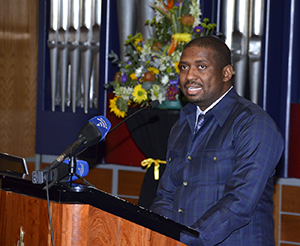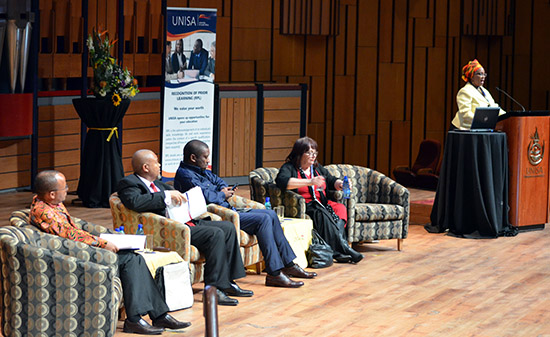

Deputy Minister of Higher Education and Training, Mr Buti Manamela
Questions around student success must be seriously addressed if open learning is to live up to its promise, says South Africa’s Deputy Minister of Higher Education and Training, Mr Buti Manamela.
Speaking at the opening of the Open Learning Conference 2018, held at Unisa from 5 to 7 September, he highlighted both the opportunities and challenges that open learning presents.
“Several important questions which I think we should be asking ourselves in relation to our stated commitment to open learning include questions related to student success and graduate attributes,” Manamela told delegates attending the conference, being jointly hosted by Unisa, the University of Pretoria, the Distance Education Association of Southern Africa (DEASA) and the National Association of Distance Education and Open Learning in South Africa (NADEOSA).
Over 18 countries are represented, including Botswana, Kenya, Lesotho, Mozambique, Namibia, Nigeria, Swaziland, Tanzania, Zambia and Zimbabwe.
In his address, Manamela made it clear his department does not associate open learning with any particular mode of delivery but considers it to be an approach based on principles that include learner-centredness, lifelong learning, flexibility of learning provision, student support, rigorous quality assurance and the construction of programmes in the expectation that the student will succeed.
“To what extent are students put at the centre of our institutions’ operations? To what extent is student success paramount to our approach to education delivery? Are our teaching and learning mechanisms, and our student support mechanisms, based on a deep understanding of who are students are?”

In addition to the Deputy Minister (centre), speakers at day one of the Open Learning Conference were (from right) Prof Mpine Makoe, President of DEASA, Prof Daniella Coetzee, President of NADEOSA, Prof Mandla Makhanya, Unisa Principal and Vice-Chancellor, and Prof Chika Sehoole, Dean of Education at the University of Pretoria.
Manamela said current statistics did not paint a flattering picture of student success. Dropout rates are very high and throughput rates are very low,” he said, adding that student success was not only about students graduating but also about having the necessary attributes to contribute to the changing world of work and the advent of the Fourth Industrial Revolution.
These attributes include life and career skills, higher levels of digital literacy, an understanding of the emerging digital landscape and the ability to make appropriate choices, critical thinking, flexibility, creativity and complex problem-solving social and system skills, among others.
“Digitisation offers many opportunities in support of open learning, such as digital learning platforms, digitised and interactive courses and material, and social media support for students, student interaction and student-lecturer interaction,” he said.
However, open and distance learning (ODL) institutions still tend to rely heavily on print-based materials. Even when information and communications technology (ICT) is used, it is often simply a delivery mechanism for learning and support material.
“Programmes that position themselves as open still rely very heavily on commercially produced textbooks,” the Deputy Minister added, noting that such textbooks were typically revised annually, adding to the burden on students.
Other serious challenges to effective open learning are inequities in ICT infrastructure and connectivity, in which countries must invest as a priority in order to bridge the digital divide separating many Africans from quality higher education.
“If we don’t pay serious attention to these questions and respond to them effectively, we will turn the promise that open learning offers into a fairy tale that reads well in policies books and articles but with little impact on our people, especially the poor and marginalised who look to the education system for opportunities and progress,” Manamela said.
“We look to you to provide intellectual leadership,” he said, calling on conference delegates to view the three-day event as “catalyst” to help make the promise of open learning a reality.
Publish date: 2018-09-10 00:00:00.0